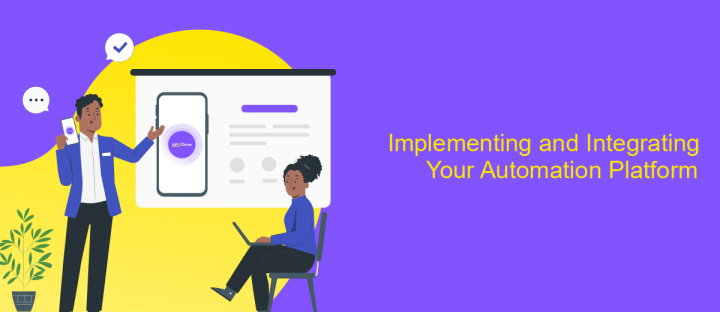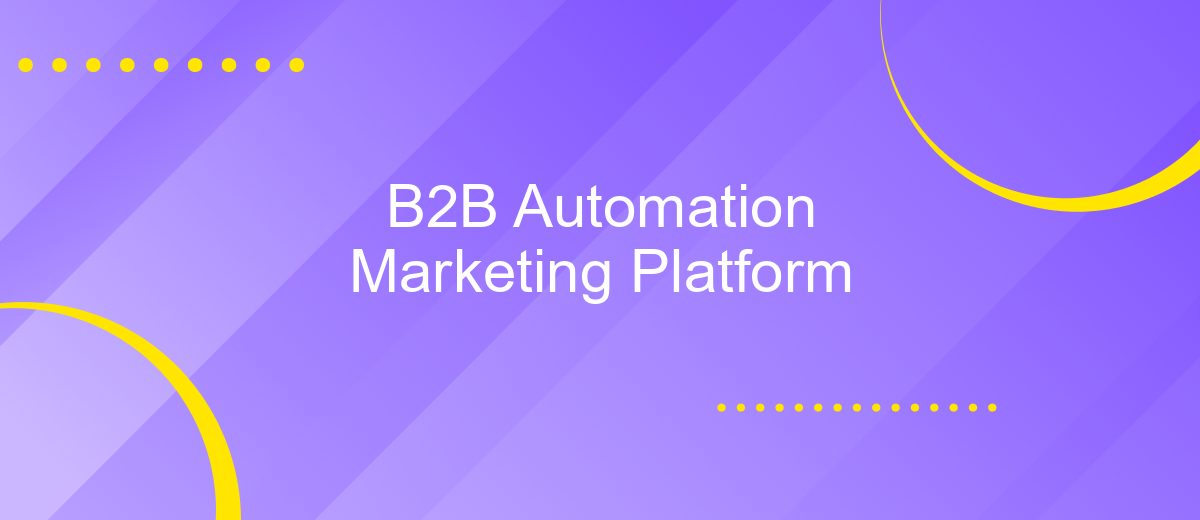B2B Automation Marketing Platform
In today's competitive business landscape, leveraging automation in marketing is no longer a luxury but a necessity. A B2B Automation Marketing Platform empowers businesses to streamline operations, enhance customer engagement, and drive growth efficiently. By automating repetitive tasks and personalizing interactions, companies can focus on strategic initiatives and achieve higher ROI. Discover how this transformative tool can revolutionize your marketing efforts and propel your business forward.
Understanding the Power of B2B Automation Marketing Platforms
In the rapidly evolving world of B2B marketing, automation platforms are revolutionizing how businesses connect with their clients. These platforms streamline and enhance marketing efforts, allowing companies to efficiently target and engage potential customers. By automating repetitive tasks, businesses can focus on strategic planning and creative execution, ultimately driving growth and revenue.
- Increased Efficiency: Automation reduces manual tasks, freeing up time for strategic initiatives.
- Enhanced Targeting: Platforms provide data-driven insights for precise audience segmentation.
- Improved Lead Nurturing: Automated workflows ensure timely follow-ups and personalized communication.
- Scalability: Easily manage and expand marketing efforts as your business grows.
- Measurable Results: Track and analyze campaign performance with real-time analytics.
Embracing a B2B automation marketing platform empowers businesses to stay competitive in a digital-first landscape. By leveraging advanced tools and technologies, companies can deliver more personalized and impactful marketing experiences. This not only strengthens relationships with existing clients but also attracts new prospects, fostering long-term success. As the demand for efficient and effective marketing solutions continues to rise, these platforms are becoming indispensable assets for forward-thinking businesses.
Key Features and Functionalities to Look For

When selecting a B2B automation marketing platform, prioritize features that enhance lead generation and customer engagement. Look for advanced segmentation capabilities that allow you to target specific audiences with personalized content, increasing the relevance and effectiveness of your campaigns. Automation of email marketing, social media, and CRM integration should be seamless, enabling you to maintain consistent communication across all channels. Additionally, robust analytics and reporting tools are essential for tracking performance metrics and optimizing strategies in real-time.
Integration capabilities are crucial for a cohesive marketing strategy. Platforms that offer easy integration with existing tools and services, such as CRM systems and data management platforms, are invaluable. Consider using services like ApiX-Drive, which facilitate smooth integration processes, allowing you to connect various applications without technical expertise. This ensures your marketing efforts are synchronized and efficient. Lastly, prioritize platforms with scalable solutions to accommodate your business growth, ensuring long-term viability and success.
Choosing the Right Platform for Your Business Needs

When selecting a B2B automation marketing platform, it's essential to align the platform's features with your business objectives. Consider your company's size, target audience, and specific marketing goals. A well-chosen platform can streamline processes, enhance customer engagement, and drive sales growth.
- Identify your core marketing needs, such as lead generation, email campaigns, or customer segmentation.
- Evaluate the platform's integration capabilities with your existing CRM and other tools.
- Assess the platform's scalability to ensure it can grow alongside your business.
- Consider the level of customer support and training provided by the vendor.
- Analyze pricing structures to ensure they fit within your budget constraints.
Ultimately, the right platform should offer a balance between functionality and ease of use, enabling your team to efficiently manage marketing activities. By thoroughly evaluating your options, you can choose a solution that not only meets your current needs but also adapts to future marketing challenges.
Implementing and Integrating Your Automation Platform

Implementing a B2B automation marketing platform requires careful planning and a strategic approach. Begin by assessing your current marketing processes and identifying areas where automation can enhance efficiency. Collaborate with key stakeholders to define your goals and set measurable objectives for the platform's implementation.
Integration with existing systems is crucial for a seamless transition. Ensure compatibility with your CRM, email marketing tools, and analytics platforms. Work closely with your IT team to address any technical challenges and establish a robust data flow between systems.
- Conduct a thorough audit of your existing marketing tools and processes.
- Define clear objectives and KPIs for the automation platform.
- Ensure seamless integration with existing systems like CRM and email tools.
- Train your marketing team to effectively use the new platform.
Once implemented, continuously monitor the platform's performance and make data-driven adjustments to optimize results. Regularly review your automation strategies to ensure they align with evolving business goals. By integrating and utilizing your automation platform effectively, you can enhance customer engagement and drive business growth.


Measuring Success and Optimizing Your Automation Strategy
Measuring the success of your B2B automation marketing platform is crucial to ensure that your strategies are effective and delivering the desired results. Begin by setting clear, quantifiable goals and key performance indicators (KPIs) such as lead conversion rates, customer engagement levels, and return on investment (ROI). Regularly analyze these metrics using analytics tools to gain insights into the performance of your campaigns. This data-driven approach will help you identify strengths and weaknesses, allowing you to make informed decisions and adjustments to your strategy.
Optimizing your automation strategy involves continuous testing and refinement. Implement A/B testing to evaluate different elements of your campaigns, such as subject lines, call-to-actions, and content formats. Utilize integration services like ApiX-Drive to seamlessly connect various marketing tools and platforms, ensuring a smooth data flow and comprehensive analysis. By leveraging these integrations, you can automate repetitive tasks and focus on strategic improvements. Regularly review your automation workflows and update them based on the latest market trends and customer feedback to maintain a competitive edge.
FAQ
What is a B2B automation marketing platform?
How can a B2B automation marketing platform benefit my business?
What are some key features to look for in a B2B automation marketing platform?
How do I integrate a B2B automation marketing platform with my existing systems?
What are some common challenges when implementing a B2B automation marketing platform?
Do you want to achieve your goals in business, career and life faster and better? Do it with ApiX-Drive – a tool that will remove a significant part of the routine from workflows and free up additional time to achieve your goals. Test the capabilities of Apix-Drive for free – see for yourself the effectiveness of the tool.

